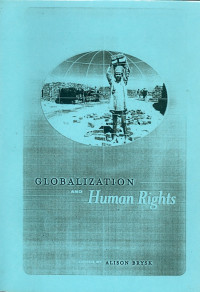
Text
Globalization and Human Rights
Indeed, before World War II, except for minor exceptions, individuals had no rights that could be asserted against the state in the context of international law. World War II changed the world's perspective. The Nazi experience and the Holocaust revealed the horror that could result from a legal system in which the individual counted for nothing. As the nations met to draft the U.N. Charter, there was a renewed search for immutable principles to protect humanity against the brutality the world had just witnessed. What developed and became embodied in the Charter of the United Nations and the Universal Declaration of Human Rights was an international morality based on the autonomy of the individual protected by international law. Thus, the very first Article of the U.N. Charter states that the very purpose of the Charter is to maintain peace and promote respect for human rights and fundamental freedoms.' The U.N. Charter was followed by the Universal Declaration of Human Rights4 ("Declaration" or "Universal Declaration") in 1948. The Declaration is a Bill of Rights for the world. Its fundamental concept is asserted at the beginning: "Whereas recognition of the inherent dignity and of the equal and inalienable rights of all members of the human family is the foundation of freedom, justice and peace in the world." The Declaration then sets forth the basic civil, political, economic, and social human rights for civilization.
Availability
| KP.1 00018 | KP 1 BRY g | My Library | Available |
| KP 1.00018-01 | KP 1 BRY g | My Library | Available |
Detail Information
- Series Title
-
-
- Call Number
-
KP 1 BRY g
- Publisher
- Los angeles : University of california press., 2002
- Collation
-
x, 311 hlm. : tabel. ; 23 cm.
- Language
-
English
- ISBN/ISSN
-
-
- Classification
-
KP 1
- Content Type
-
-
- Media Type
-
-
- Carrier Type
-
-
- Edition
-
-
- Subject(s)
- Specific Detail Info
-
-
- Statement of Responsibility
-
-
Other version/related
No other version available
File Attachment
Comments
You must be logged in to post a comment
 Computer Science, Information & General Works
Computer Science, Information & General Works  Philosophy & Psychology
Philosophy & Psychology  Religion
Religion  Social Sciences
Social Sciences  Language
Language  Pure Science
Pure Science  Applied Sciences
Applied Sciences  Art & Recreation
Art & Recreation  Literature
Literature  History & Geography
History & Geography